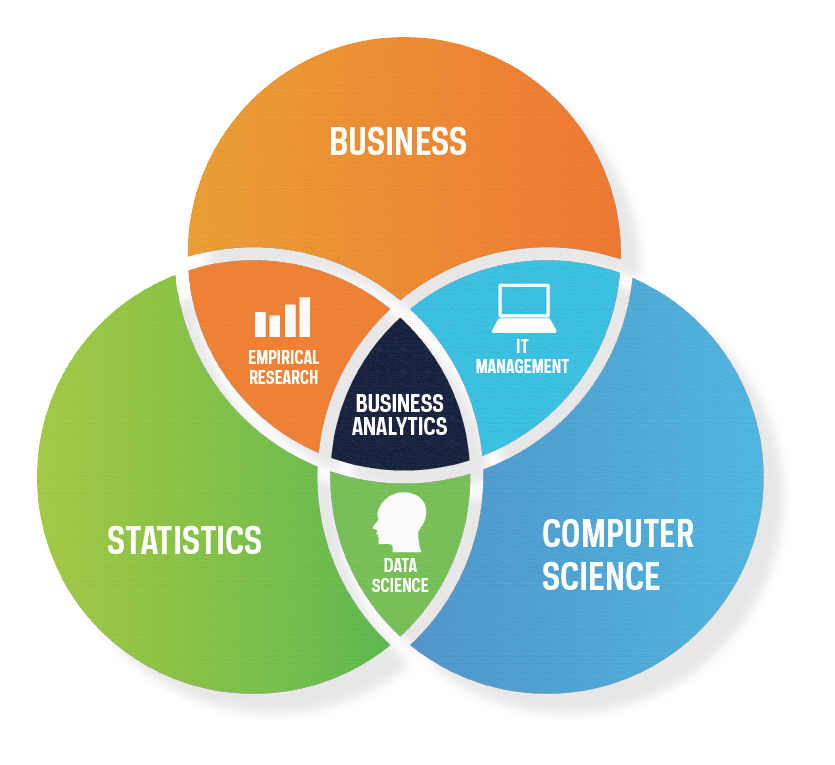MSBA Curriculum
Orientation
Now Irish
Module 1
Fall Curriculum
Experiential Learning
Grow Irish Week
Module 2
Fall Curriculum
Module 3
Spring Curriculum
Experiential Learning
Grow Irish Week
Module 4
Spring Curriculum
Commencement
Forever Irish
 Over two semesters and 31 credit hours, you will learn to apply analytics techniques for “big data”
Over two semesters and 31 credit hours, you will learn to apply analytics techniques for “big data”
The MSBA curriculum provides a set of courses around tools and technologies and a set of courses around business analytics applications and skills. Additional coursework and immersions focus on the context of how analytics is used in business organizations. Learn data mining, data storage and manipulation, data visualization, statistics, modeling, optimization, and simulation in a variety of business areas such as finance, operations, and marketing.
Fall Curriculum
2 Credits
In this course students will learn the fundamental building blocks of statistical analysis, while continuing to develop programming skills. Topics such as probability distributions, estimation, hypothesis testing, and regression analysis will be covered. Throughout the course, students will be able to apply these concepts to real-world problems.
2 Credits
Analysts increasingly make decisions on issues that are complex and have quantitative aspects. This course explores how simulation and optimization can improve this type of decision making. All tools are studied in the context of real-world applications from several business functions: operations, finance, and accounting. Specific applications include logistics systems, process improvement, portfolio selection, financial planning, options pricing, and cash balance analysis. General principles that can enhance the choice and application of these tools will be discussed.
2 Credits
Mastery of tools and techniques for accessing, processing, and visualizing large quantities of data is an increasingly essential skill for business professionals. The course will cover database concepts, structured query languages, data cleaning and transformation processes, core concepts for visual analysis of complex data, and developing effective and useful visualizations. The emphasis is on a hands-on introduction to tools typical of those currently used in businesses, as well as tools for compelling exploratory data analyses.
2 Credits
Relational databases store the majority of the information used in business analytics efforts and data analysts work with these crucial infrastructure platforms on a daily basis. In this course, you will gain an understanding of the key concepts surrounding the storage and security of structured data in relational databases. You will learn how to create, modify and query databases using the Structured Query Language (SQL). You will also gain an understanding of the issues surrounding Big Data applications and the use of unstructured data in business analytics efforts.
1 Credit
The course is designed to provide MSBA students with the tools to manage their career throughout their lifetime. It not only addresses the planning process necessary to start the job search, but also incorporates specific assistance in such areas as resume writing, interview preparation and skills, networking and other tactics.
2 Credits
In Advanced Statistical Inference students learn a variety of statistical methods that go beyond basic statistics. In particular, the course will deal with making inferences about one or more population quantities from sample data in the context of multiple groups and/or multiple variables. Principles of sound statistical reasoning and the theoretical underpinnings of statistical inference are integrated throughout the course. Specific topics include advanced regression techniques, simple and factorial analysis of variance and covariance, chi-square goodness of fit and tests of independence, inference for proportions, multivariate analysis of variance, among others. For each method, the course will emphasize knowing (a) when it should be implemented, (b) how to implement it, (c) its limitations, and (d) how to interpret its results.
2 Credits
It is very important in the current age of big data and data-driven business models to have basic skills of programming. This course introduces students to Python, a widely used programming language among data scientists, with the goal of cleaning, modeling, transforming and analyzing data. Students will learn fundamentals of programming, use python packages for acquiring data from various sources, learn skills to slice and dice the data and produce data visualizations. They will gain experience in Python and apply these skills in generating reproducible reports in business contexts. Also, this course prepares them for more advanced data science and machine learning methods.
2 Credits
This course introduces students to the process of performing high-valued analytics with unstructured and semi-structured data to support business decisions. Students will identify relevant data sources (big and small), learn how to use contemporary technologies such as the Hadoop ecosystem to store and process the data, implement advanced processing and analytical techniques, and develop predictive models. The course will introduce and use concepts in machine learning, natural language processing and information retrieval to solve real-world problems.
2 Credits
This course provides guiding principles for designing data presentations that are clear, effective, engaging, and inspire action. Students will learn how to craft a visual narrative of their data findings by becoming familiar with different methods for displaying data, learning which methods best convey a particular message, and producing and delivering effective representations of complex data trends, patterns, and technical ideas.

Grow Irish Week
Experiential learning is an essential component of your education at Mendoza. Occurring once in the Fall and once in the Spring, Grow Irish Week equips you with the necessary skills to accelerate your career and make an impact on society.
More About Grow Irish WeekSpring Semester
2 Credits
Semester long course-Mod 3 & 4
This course is the capstone for the program and provides an intensive integrative experience while students work with one or more industry partners. Students will be presented with a real business problem and access to relevant data, and will need to develop a thorough understanding of the problem and the associated data, then develop and execute a project work plan that analyzes the data available, develops actionable recommendations, and provides insight into the basis for those recommendations. Skills developed include the ability to provide effective communication of analytics results, and an understanding of key aspects of analytics solution deployment.
2 Credits
This course introduces students to the process of performing high-valued analytics with unstructured and semi-structured data to support business decisions. Students will identify relevant data sources (big and small), learn how to use contemporary technologies to process the data, implement advanced processing and analytical techniques, and develop predictive models. The course will introduce and use concepts in machine learning, natural language processing and information retrieval to solve real-world problems.
Coming Soon
Choose from the MSBA Electives listed at the bottom of this page.
Semester long course-Mod 3 & 4
Statistical consultation for Analytics Capstone.
2 Credits
Broadly speaking, social networks are the patterns of relationships between actors. As actors in these systems are not independent, each actor influences the behaviors of others in the network. Our connections to others can determine a great many aspects of our lives. This course will explore how relationships between individuals, organizations, and individuals within organizations can shape the actors within those social systems. In this class, we will explore the theory and analysis of social networks in a variety of settings, including but not limited to economic contagions, team performance, and the spread of infections and information through networks. At the end of this class, students will be able to apply a social networks lens to their own intellectual interests and leadership aspirations.
2 Credits
Data-informed decision making has created new opportunities, but also expands the set of possible risks to organizations. One of these risks comes from grappling with the “should we?” question with regard to data and analytics, and associated privacy concerns. In this course, we will explore several frameworks to address the issues related to the proper roles of public law, government regulation, and ethics in performing and managing analytics activities. The course will cover applicable theory and guidelines, and also make use of case studies. Upon completion, the student should be comfortable adapting one of these ethical frameworks for use in alignment with their organizational mission.
Choose from the MSBA Electives listed at the bottom of this page.
MSBA Electives
*MSBA Electives are subject to change (2 credit hours required, 4 possible)
2 Credits
Many industries are being created and transformed by using the techniques of business analytics. With the goal of studying these techniques in some depth, this course focuses on one such industry: sports. This industry has clearly benefited from the application of a wide variety of analytics techniques, and has the advantage of being widely and closely followed, with large amounts of easily-accessible real-world data. Topics for study in this course include how to evaluate players, rate teams, schedule leagues, and enhance coaching strategies. Assignments involve the hands-on use of a variety of techniques and tools, which are useful in most industries. Techniques and tools include data manipulation, probability, statistics, optimization, spreadsheets, and a powerful statistics package. A basic knowledge of Excel, statistics, and sports (in particular, baseball, basketball, and football) is assumed. (You do not have to be a sports fanatic.)
2 Credits
There is no shortage of data in the world. While data is constantly swirling around us, actually acquiring it can prove difficult. To make actionable insights, we need a way to collect that data and prepare it for analysis. In this course, you will learn how to acquire data through several methods: application programming interfaces (APIs), web scraping, web-based surveys, and streaming. We will take an in-depth look at each of these technologies, so that you can apply them in any real analytics scenario. You will be able to use these various technologies to collect data and conduct analyses commonly seen for each type of method (from standard modeling techniques to factor analysis and beyond). This course will focus on using R, Python, and Qualtrics to collect and analyze data, in addition to exploring modern data streaming technologies. While Qualtrics will be used for survey creation and administration, the survey methodology skills will translate to any survey program.
2 Credits
Many companies are rapidly working to create core competencies that will allow them to utilize data about their customers. By utilizing personal and behavioral data, they have the ability to influence users with algorithms that encourage dependencies on their platforms and products. Additionally, they can harvest personal first-party data to target users with ads and provide personalized experiences to drive higher engagement and profit. This course will provide an understanding of the tools, concepts, analytics, strategies and ethical considerations behind the adoption of these competencies including: estimating return on marketing investments; pricing and new product introduction decisions; Customer Lifetime Value (CLV) analysis; and determining the optimal level of advertising and advertising allocation analysis.
